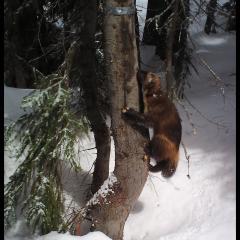About Robert's Work
Dr. Robert Long is a Senior Conservation Scientist at Woodland Park Zoo in Seattle. He was hired in 2013 to coordinate carnivore research and conservation projects associated with the Zoo’s Living Northwest Program. Prior to joining the zoo Robert was a research ecologist for Montana State Universities Western Transportation Institute, where he conducted studies related to the barrier effects of human transportation networks on carnivores, and methods for mitigating these effects.
Robert has twenty-plus years of experience studying a broad diversity of wildlife on the East and West Coasts of the U.S., including black bears, fishers, martens, wolverines, bobcats, foxes, spotted owls, marbled murrelets, coyotes, and deer. His research interests include carnivore ecology, wildlife habitat connectivity, and noninvasive methods for studying wildlife populations. Robert holds two B.S. degrees from Humboldt State University, an M.S. from the University of Maine, and a Ph.D. from the University of Vermont. He is the co-editor of 'Noninvasive Survey Methods for Carnivores' (Island Press, 2008).
His field projects at Woodland Park Zoo currently include developing noninvasive methods and protocols for detecting and monitoring wolverines in the North Cascades, launching a network to facilitate the collaboration and coordination of regional camera-trapping efforts, and exploring how carnivores use the urban-to-wildland landscape gradient adjoining Seattle. When he’s not out hiking in wild places, he enjoys biking, playing soccer, reading, and eating good food. He lives on Bainbridge Island with his wife and field partner, Paula MacKay, and their dog, Alder.



